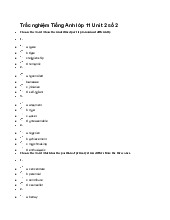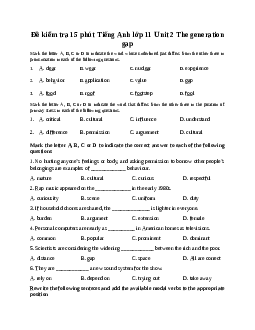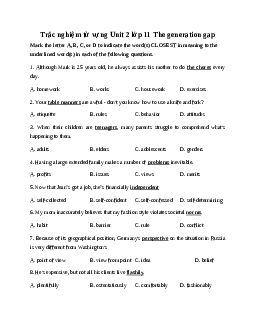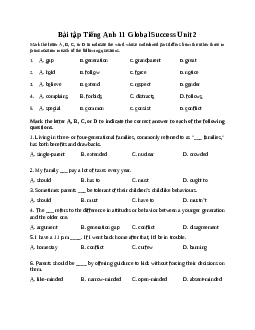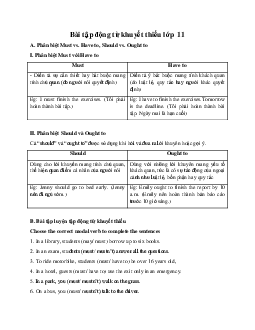




Preview text:
Giải Unit 2 Lớp 11 Getting Started trang 18, 19 Bài 1
What is a generation gap?
(Khoảng cách thế hệ là gì?) Listen and read. (Nghe và đọc.)
Ms Hoa: Good morning, class. Today, we'll talk about the generation gap. So, what is the generation gap?
Mark: Well, I think it's the difference in beliefs and behaviours between young and older people.
Ms Hoa: You're right, Mark. So, Is there a generation gap in your family?
Mark: Not really, Ms Hoa. I live in a nuclear family with my parents and brother. We
understand each other quite well though we still argue over small things.
Ms Hoa: Right. We can't avoid daily arguments. What about you, Mai?
Mai: Well, I live with my extended family, and I have to learn to accept the
differences between the generations.
Ms Hoa: That's a good point. Can you give us an example?
Mai: Well, my grandparents hold traditional views about male jobs and gender roles.
For example, my grandfather wants my brother to be an engineer, but my brother
hopes to become a musician. And my grandmother thinks women have to do all the housework.
Ms Hoa: How about your parents? Do they share your grandparents' views?
Mai: No, they don't. They think that we should follow our dreams. They give us
advice, but never force us to follow in their footsteps.
Ms Hoa: Thank you, Mai, for sharing your experiences. You must respect your
parents and grandparents, but you should also express your opinion. Now let's
continue our discussion with… Dịch nghĩa
Cô Hoa: Chào cả lớp. Hôm nay, chúng ta sẽ nói về khoảng cách thế hệ. Vậy, khoảng cách thế hệ là gì?
Mark: Chà, em nghĩ đó là sự khác biệt trong niềm tin và hành vi giữa người trẻ và người lớn tuổi.
Cô Hoa: Em nói đúng, Mark. Vì vậy, có một khoảng cách thế hệ trong gia đình của bạn?
Mark: Không hẳn, cô Hoa. Em sống trong một gia đình hạt nhân với cha mẹ và anh
trai của em. Chúng em khá hiểu nhau dù vẫn tranh cãi vì những điều nhỏ nhặt.
Cô Hoa: Đúng. Chúng ta không tránh khỏi những tranh cãi hàng ngày. Còn em thì sao Mai?
Mai: À, em sống với đại gia đình của mình, và em phải học cách chấp nhận sự khác
biệt giữa các thế hệ.
Cô Hoa: Đó là một điểm tốt. Em có thể cho chúng tôi một ví dụ?
Mai: À, ông bà em có quan điểm truyền thống về công việc và vai trò giới của nam
giới. Ví dụ, ông em muốn anh trai em trở thành một kỹ sư, nhưng anh trai em muốn
trở thành một nhạc sĩ. Và bà em nghĩ phụ nữ phải làm tất cả việc nhà.
Cô Hoa: Còn bố mẹ em thì sao? Họ có chia sẻ quan điểm của ông bà em không?
Mai: Không, họ không. Họ nghĩ rằng chúng ta nên theo đuổi ước mơ của mình. Họ
cho chúng ta lời khuyên, nhưng không bao giờ bắt chúng ta phải làm theo những gì họ đã làm.
Ms Hoa: Cảm ơn Mai đã chia sẻ kinh nghiệm. Em phải tôn trọng cha mẹ và ông bà
của em, nhưng em cũng nên bày tỏ ý kiến của mình. Bây giờ chúng ta hãy tiếp tục thảo luận với... Bài 2
Read the conversation again. Tick (✓) the true information about Mark and Mai.
(Nghe đoạn hội thoại một lần nữa. Đánh dấu (✓) vào thông tin đúng về Mark và Mai.) Mark Mai
1. has some arguments over small things with family members.
2. lives with grandparents who have traditional views. 3. lives in a nuclear family.
4. has parents who don't force their children to follow in their footsteps. Gợi ý đáp án Mark Mai
1. has some arguments over small things with family members. ✓
(có một số tranh luận về những điều nhỏ nhặt với các thành viên trong gia đình.)
2. lives with grandparents who have traditional views. ✓
(sống với ông bà có quan điểm truyền thống.) 3. lives in a nuclear family. ✓
(sống trong một gia đình hạt nhân.)
4. has parents who don't force their children to follow in their ✓ footsteps.
(có cha mẹ không ép buộc con cái tiếp bước theo mình.) Bài 3
Find words or phrases in 1 that have the following meanings.
(Tìm từ hoặc cụm từ trong bài 1 có nghĩa như sau.) Yêu cầu Đáp án
1. all people who were born at about the same time
2. a family that consists of a father, a mother, and children
3. a family that includes not only parents and children but also
uncles, aunts, grandparents, etc. 4. disagreements about things Gợi ý đáp án 1 - generation 2 - nuclear family 3 - extended family 4 - argument Bài 4
Choose the modal verbs used in 1 to complete the sentences.
(Chọn động từ khuyết thiếu được sử dụng trong bài 1 để hoàn thành câu.)
1. Mai lives with her extended family, and she has to/should learn to accept the
differences between the generations.
2. Mai's grandmother thinks women have to/ should do all the housework.
3. Mai's parents believe that children must/ should follow their dreams.
4. Ms Hoa thinks that children have to/must respect their parents and grandparents Gợi ý đáp án 1 - has to 2 - have to 3 - should 4 - must
